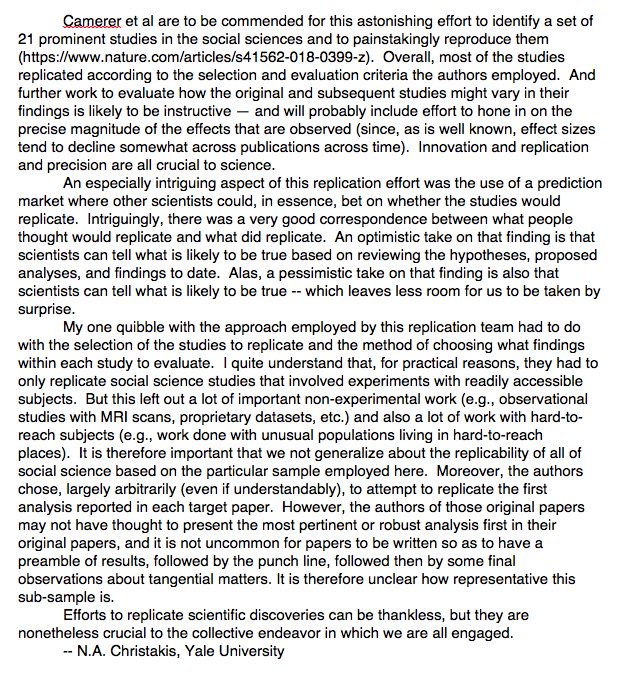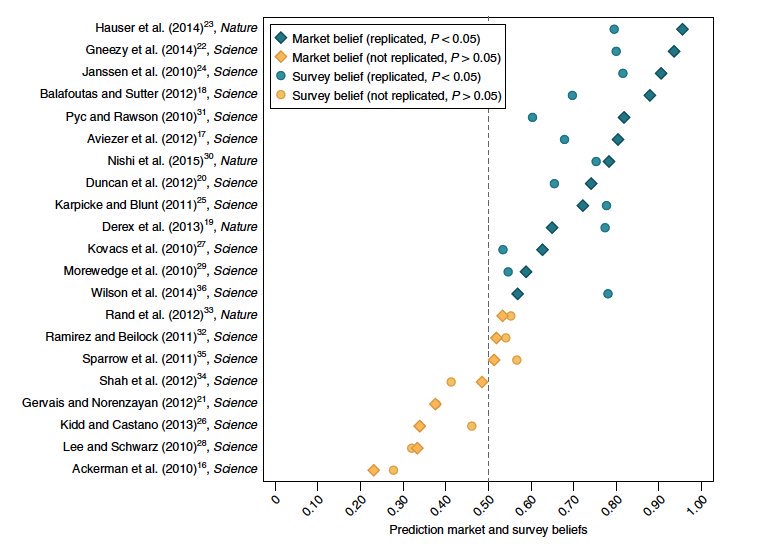-
 seeker98747
seeker98747
- 485
- 1
- 0
- 0
 sakanoue no fusigi
@seeker98747
sakanoue no fusigi
@seeker98747
スレッド。 twitter.com/DanTGilbert/st…
2018-09-20 18:45:01 Daniel Gilbert
@DanTGilbert
Daniel Gilbert
@DanTGilbert
@NAChristakis @talyarkoni @kinggary @hardsci Publication is not canonization. Journals are not gospels. They are the vehicles we use to tell each other what we saw (hence “Letters” & “proceedings”). The bar for communicating to each other should not be high. We can decide for ourselves what to make of each other's speech.
2018-09-20 07:38:01 Nicholas A. Christakis
@NAChristakis
Nicholas A. Christakis
@NAChristakis
A 2017 article about the replicability of findings in cancer biology, noting similar levels of replication in that field (2 of 5 studies replicated easily, and others had certain issues): sciencemag.org/news/2017/01/r… via @zakkohane 10/
2018-08-28 22:46:12 Nicholas A. Christakis
@NAChristakis
Nicholas A. Christakis
@NAChristakis
And here is one bettor, @JoeHilgard, explaining how betting markets work and sharing his bets on which scientific papers would replicate. twitter.com/joehilgard/sta… Spoiler: he made money. 9/
2018-08-28 19:14:57 Joe Hilgard, data guy
@JoeHilgard
Joe Hilgard, data guy
@JoeHilgard
My results from betting on the latest replication project. I thought the high-priced stuff was priced about right, so I left them alone. But I saw profit in shorting the unlikely stuff, so I sandbagged the ones least likely to replicate. pic.twitter.com/kGzhTZeQyo
2018-08-28 01:22:21 Nicholas A. Christakis
@NAChristakis
Nicholas A. Christakis
@NAChristakis
And here is coverage by @KellyServick in @sciencemagazine of this effort to evaluate replicability of claims in high-profile social science papers (also well noting that only one finding per paper was chosen -- a key concern of mine, too). sciencemag.org/news/2018/08/g… 8/
2018-08-28 03:27:59 Nicholas A. Christakis
@NAChristakis
Nicholas A. Christakis
@NAChristakis
It’s clear both extremes wouldn't serve us well: only doing replications would mean we don't allocate funds to make new discoveries; never doing replications means we may lose confidence in what we know. In a way, it’s a type 1/type 2 error issue. But I lean towards discovery 7/
2018-08-28 00:56:00 Nicholas A. Christakis
@NAChristakis
Nicholas A. Christakis
@NAChristakis
i also think that the scientific community will have to come to some rough consensus about the balance between resources allocated to new discovery-based science and to replication efforts. Both are clearly important. But what that balance should be, we do not yet know... 6/
2018-08-28 00:54:10 Nicholas A. Christakis
@NAChristakis
Nicholas A. Christakis
@NAChristakis
Detailed coverage of this replication effort by @edyong209 in @TheAtlantic with a particular focus on the cool prediction market aspect of this study, demonstrating that scientists can be strong assayers of reality: theatlantic.com/science/archiv… 5/
2018-08-28 00:51:03 Nicholas A. Christakis
@NAChristakis
Nicholas A. Christakis
@NAChristakis
Article in @nature @NatureNews by @philipcball provides more context for this replication effort in the social sciences (lately facing similar replicability challenges as some branches of the biological and physical sciences). nature.com/articles/d4158… 4/
2018-08-28 00:43:52 Nicholas A. Christakis
@NAChristakis
Nicholas A. Christakis
@NAChristakis
I did have some concerns with the way this replication project was accomplished (though I realize that methodological decisions were inevitable). My note to @NatureHumBehav is attached. 3/ pic.twitter.com/uttPpsN1Ri
2018-08-28 00:31:29 拡大
拡大
 Nicholas A. Christakis
@NAChristakis
Nicholas A. Christakis
@NAChristakis
Our 2015 paper from @nature -- on inequality and visibility of wealth in experimental social networks -- was one of these 21 (and it was replicated). nature.com/articles/natur… Other prior replications of this work include: sciencedirect.com/science/articl… 2/
2018-08-28 00:31:29 Nicholas A. Christakis
@NAChristakis
Nicholas A. Christakis
@NAChristakis
New paper in @NatureHumBehav evaluates replicability of (portions of) 21 high-profile experiments in @nature & @sciencemagazine. It finds 62% replicate nature.com/articles/s4156… via @CFCamerer @BrianNosek et al. Interestingly, scientists could predict replicabiity in a market. 1/ pic.twitter.com/fxiosxvkwH
2018-08-28 00:31:28 拡大
拡大
